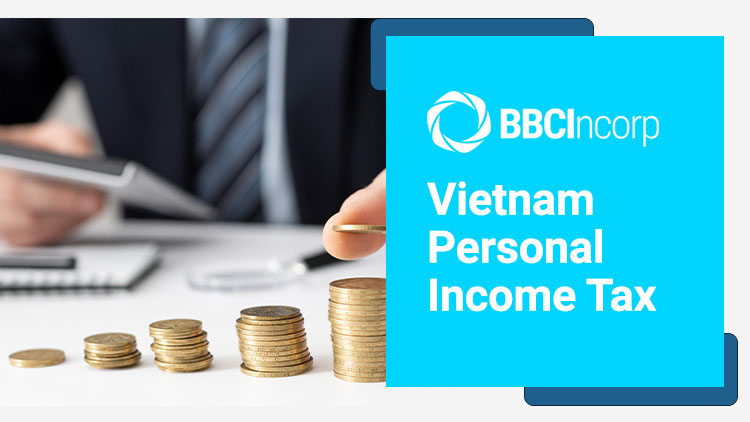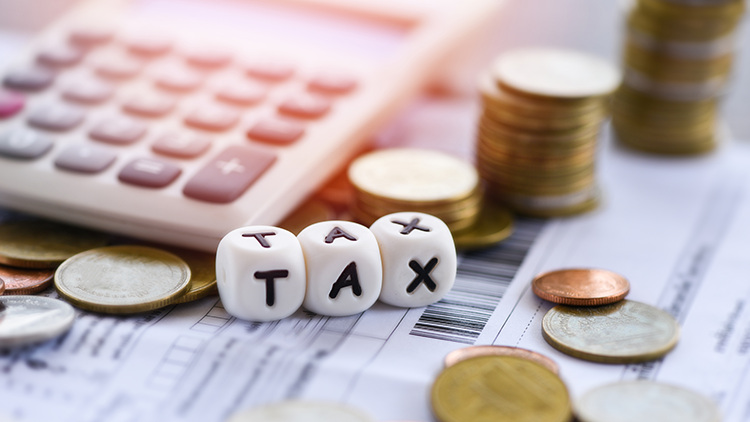
If you are a foreigner who is planning to work or currently working in Vietnam, you obviously must know and comply with the tax regulations in this jurisdiction. One noticeable advantage of the personal income tax in Vietnam is that allowable deduction is quite significant.
In this article, BBCIncorp will provide you a simple but thorough guide to Vietnam’s personal income tax. All the information on the subject is up-to-date!
1. Personal Income Tax Rates in Vietnam

Personal income tax is one of the main tax types in Vietnam tax system. Below are tax rates that will apply to your employment income as a tax resident, and a non-tax resident in Vietnam. Let’s find out!
1.1. For Tax Residents
For employment income, Vietnam applies progressive tax rates if you are a tax resident. Please look at the table below to see the specific rates imposed on different parts of income amount:
| Monthly Taxable Income (VND) | Tax Rate |
|---|---|
| Up to 5 million | 5% |
| Above 5 to 10 million | 10% |
| Above 10 to 18 million | 15% |
| Above 18 to 32 million | 20% |
| Above 32 to 52 million | 25% |
| Above 52 to 80 million | 30% |
| Above 80 million | 35% |
For business income (yearly revenue below 100 million is not deemed as business income), the tax rates vary based on sectors:
| Business Income From | Tax Rate |
|---|---|
| Distribution and supply of goods | 0.5% |
| Service or construction without the supply of raw materials | 2% |
| Lease of assets, re-sales of insurance, lottery or goods | 5% |
| Manufacture, transportation, services attached to goods, construction with the supply of raw materials | 1.5% |
| Other sectors | 1% |
For other types of income, the tax rates are described as follows:
| Types of Income | Tax Rate |
|---|---|
| Dividend/Capital Investment Income | 5% |
| Royalties or Franchising Income | 5% |
| Income from Prize-Winning | 10% |
| Income from Inheritance or Gift | 10% |
| Income from Capital Transfer | 20% on net gain |
| Income from Share/Stock Transfer | 0.1% on sales proceeds |
| Income from Real Estate Transfer | 2% on sales proceeds |
1.2. For Non-tax Residents
Similarly, for non-tax residents, different tax rates are imposed on different types of income:
| Type of Income | Tax Rate |
|---|---|
| Employment Income | 20% |
| Business Income from providing goods | 1% |
| Business Income from providing services | 5% |
| Business Income from manufacture, construction, transportation, and other sectors | 2% |
| Dividend/Capital investment income | 5% |
| Income from capital transfer | 0.1% on sales proceeds |
| Income from real estate transfer | 2% on sales proceeds |
| Income from royalties or franchising (only the amount exceeding 10 million per contract) | 5% |
| Income from inheritance or gift or prize-winning (only the amount exceeding 10 million per case) | 10% |
As you can see, the tax rates for personal income tax in Vietnam depend mainly on your residency status, as well as types of income. In what follows, we’ll delve into each determining factor.
2. Must-know Things to Determine Your Personal Tax in Vietnam

2.1. Residency Status
As the aforementioned, they impose the personal income tax in Vietnam on individuals’ earnings based mainly on their residency.
And there are two residency statuses for tax purposes: tax resident and non-tax residents.
In particular, you are deemed as a tax resident in Vietnam if you fall under one of the circumstances below:
- Your physical presence in Vietnam reaches 183 days or more in a calendar year or in 12 consecutive months from your first date of arrival; or
- You have a registered permanent residence in Vietnam or you have rented a house in Vietnam with a rental term.
With the status of a tax resident, you will be taxed on worldwide income earned both inside and outside of Vietnam.
On the other hand, you are a non-tax resident when you do not satisfy any of the conditions above. And as a non-tax resident, you will be taxed only on income that is earned within Vietnam’s territory.
2.2. Taxable Income
According to the Consolidated document Noc.15/VBHN-VPQH that regulates on personal income tax in Vietnam, the following types of income are subject to personal income tax:
- Business income with yearly revenue exceeding 100 million VND
- Employment income
- Investment income (interest/dividends)
- Earnings from transfer of capital (capital assignment) through share exchange or other forms
- Income from transfer of real estate
- Prize winnings income
- Income from copyright or royalties
- Earnings from franchising
- Inheritances income (which can be stocks, capital, real estate, or other registered properties)
- Income of gifts (which can be stocks, capital, real estate, or other registered properties)
2.3. Non-taxable Income
In Vietnam, not all types of income are subject to personal tax. Particularly, these are exempted from such tax:
- Income from transfer of real estate (or real estate inheritance/gift) between family members
- Income from transfer of residential house or land of whom having only one house or land
- Earnings from making salt, doing cultivation, forestry, or fisheries
- Deposit interest from credit institutions, banks or interest under life insurance contracts
- Compensation under life or non-life insurance contracts or other regulated compensation
- Overseas remittance, retirement pension, and scholarship
- Wages paid for night shift or overtime work, which are higher than regular wages paid for day shifts or higher than wages paid for prescribed working hours regulated by the law
- Other regulated types of income regarding charity purposes
2.4. Tax Year
For tax residents, the tax year is the calendar year (from the 1st Jan to 31st Dec). In case a foreigner stays in Vietnam for less than 183 days during the first calendar year, the first tax year will be the 12-consecutive-month period from the first arrival date in Vietnam. From the second year, the tax year will be the calendar year.
For non-tax residents, the tax period is based on the time an individual resides in Vietnam.
learn more
You as an employee (or an employer yourself) will definitely find it essential to learn about other Vietnam tax-related policies and tax types that may also affect your business directly and you as well.
Therefore, don’t miss out things like Vietnam tax credit and incentives. And don’t ignore foreign contractor withholding tax (FCWT) which is a tax scheme applicable to foreign entities providing services in Vietnam.
3. How to Reduce Personal Income Tax in Vietnam

Good news! If you are a tax resident in Vietnam, you will have two legal ways to lower your income tax: Family circumstance deduction and donation deduction.
3.1. Family Circumstance Deduction
According to The Resolution No.954/2020/UBTVQH14 released by the government, it is regulated that from 1st July 2020:
- As a taxpayer, you can automatically deduct 11 million VND (around US$471) per month from your taxable business income or employment income, and
- For each dependant, you can further deduct another 4.4 million VND (around $US188) per month from your taxable income.
However, you need to register and provide supporting documents to the local tax authority to confirm that the dependant is qualifying for the deduction policy. Qualifying dependant may be children below 18 years old, spouse, or parents who can’t work or have low income.
The law on personal income tax in Vietnam also states that taxpayers who have difficulty in paying tax due to natural disasters, accidents, or rare illnesses may be considered to reduce the amount of payable tax (determined by the tax authority).
3.2. Donation Deduction
Furthermore, you can deduct from your taxable business or employment income an amount equivalent to your contribution to:
- Approved organizations that raise or take care of children with difficulties, the disables, and the elders; or
- Certain approved charities.
Additionally, section 21 the document No.15/VBHN-VPQH also states that payments for compulsory social security contributions like Health Insurance, Unemployment Insurance, or Social Insurance can also be deducted from taxable income.
4. Tax Declaration and Payment
For employment income, personal income tax needs to be declared and paid on a monthly basis (within 20 days after a month ends) or on a quarterly basis (within 30 days after a quarter ends). Normally, organizations or persons that pay income which is subject to personal income tax are responsible for this task.
The total paid amount will then be reconciled to the year-end tax finalization. An annual tax return must be submitted within 90 days after the tax year ends and all remaining tax amount needs to be paid within the same period.
For non-employment income, the time for tax declaration and payment varies based on each type of income. Normally, it follows a receipt basis.
Foreign-invested enterprises have to conduct personal income tax finalization on behalf of their employees. And foreigners are also required to carry out personal income tax finalization on their labor contract terminations in Vietnam before their departures.
5. Key Takeaways
- Personal income tax in Vietnam varies based on your residency status and types of income. The important number to remember 183 days.
- For tax residents, worldwide employment income (regardless inside or outside of Vietnam) is taxed, with progressive rates from 5% to 35%.
- For non-tax residents, only employment income arising inside Vietnam is taxed, with a rate of 20%.
- Generally, business income (revenue exceeding 100 million VND) is taxed with different rates depending on different sectors.
- Two legal ways to reduce payable personal income tax in Vietnam are Family circumstance deduction and donation deduction.
Should have any further questions on personal income tax in Vietnam, feel free to talk to our experts. BBCIncorp is always willing to help!
Note
In addition to your personal tax rate in Vietnam as a foreigner, don’t forget to have this in your pocket before starting to work in Vietnam – how to apply for Vietnam work permit
Disclaimer
While BBCIncorp strives to make the information on this website as timely and accurate as possible, the information itself is for reference purposes only. BBCIncorp would like to inform readers that we make no representation or warranty, express or implied. Feel free to contact BCCIncorp’s customer services for advice on specific cases.
Get helpful tips and info from our newsletter!
Stay in the know and be empowered with our strategic how-tos, resources, and guidelines.

